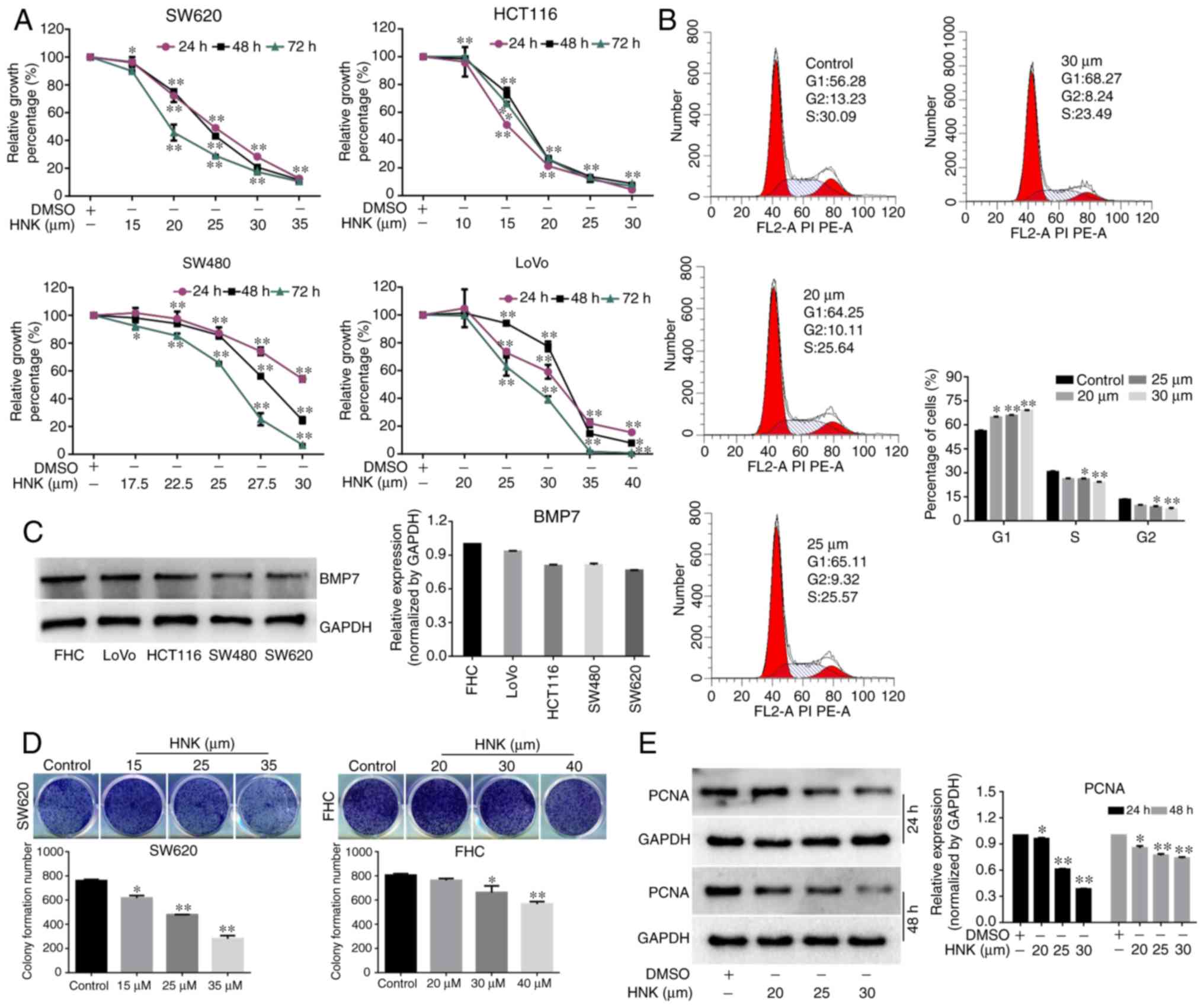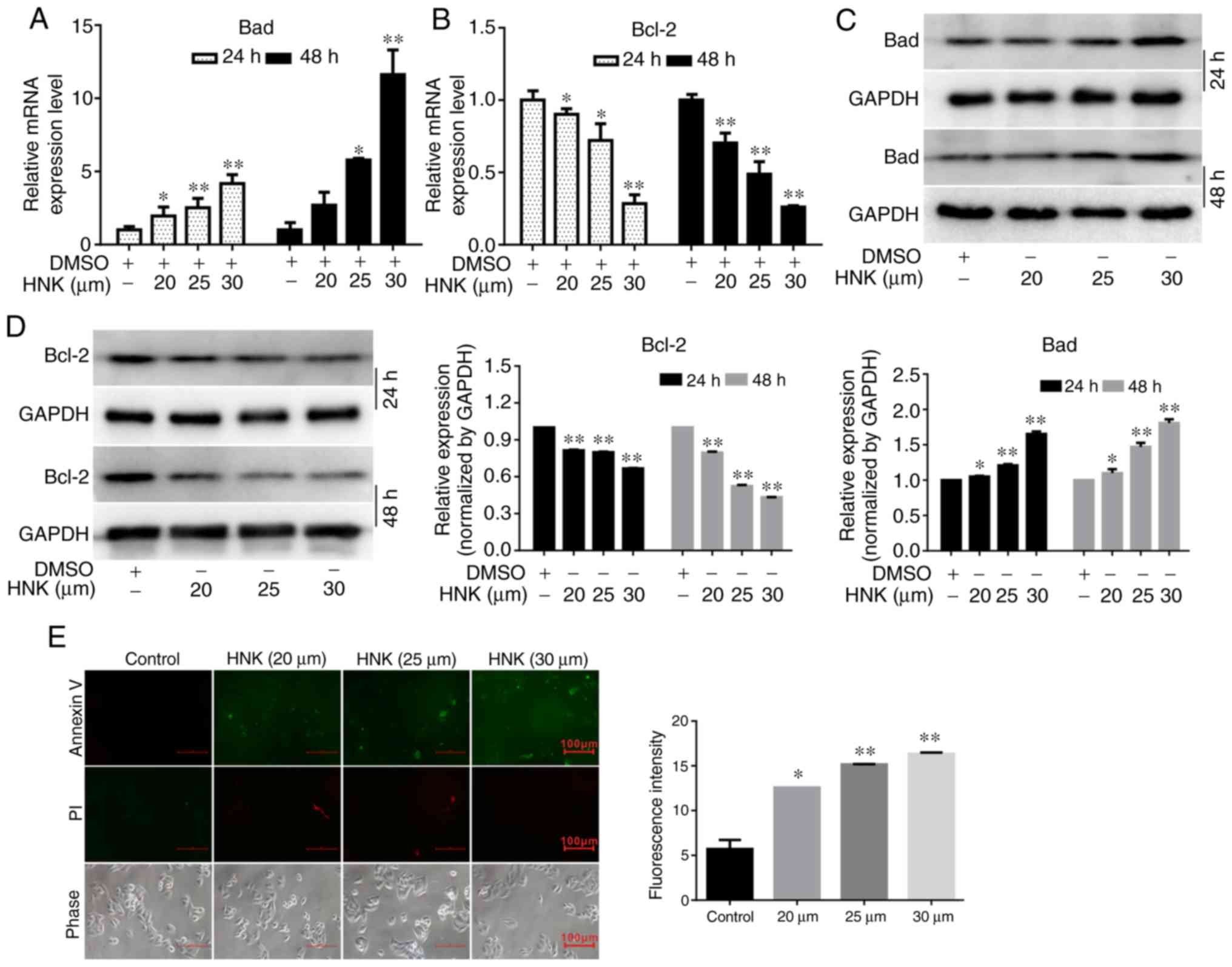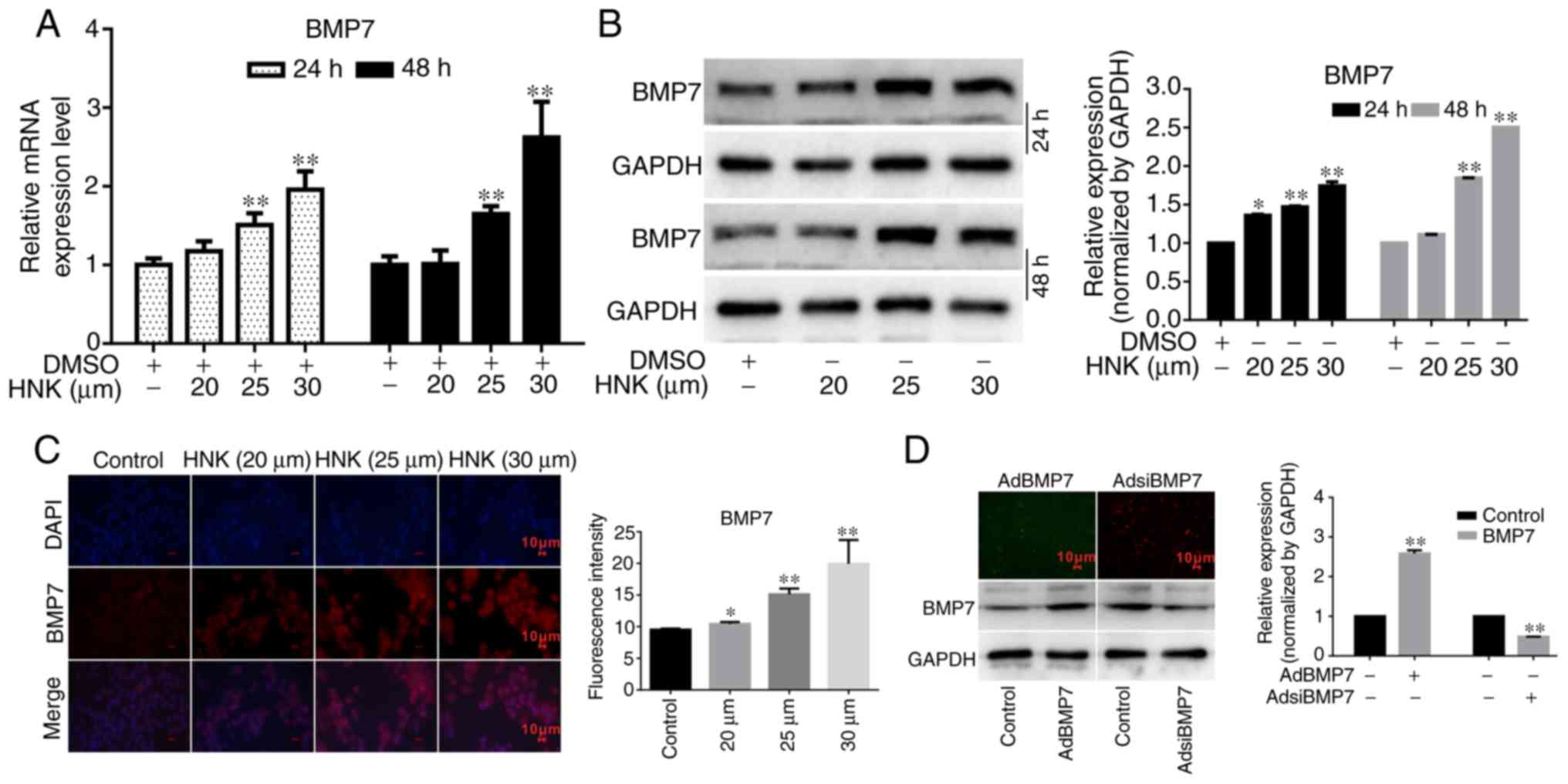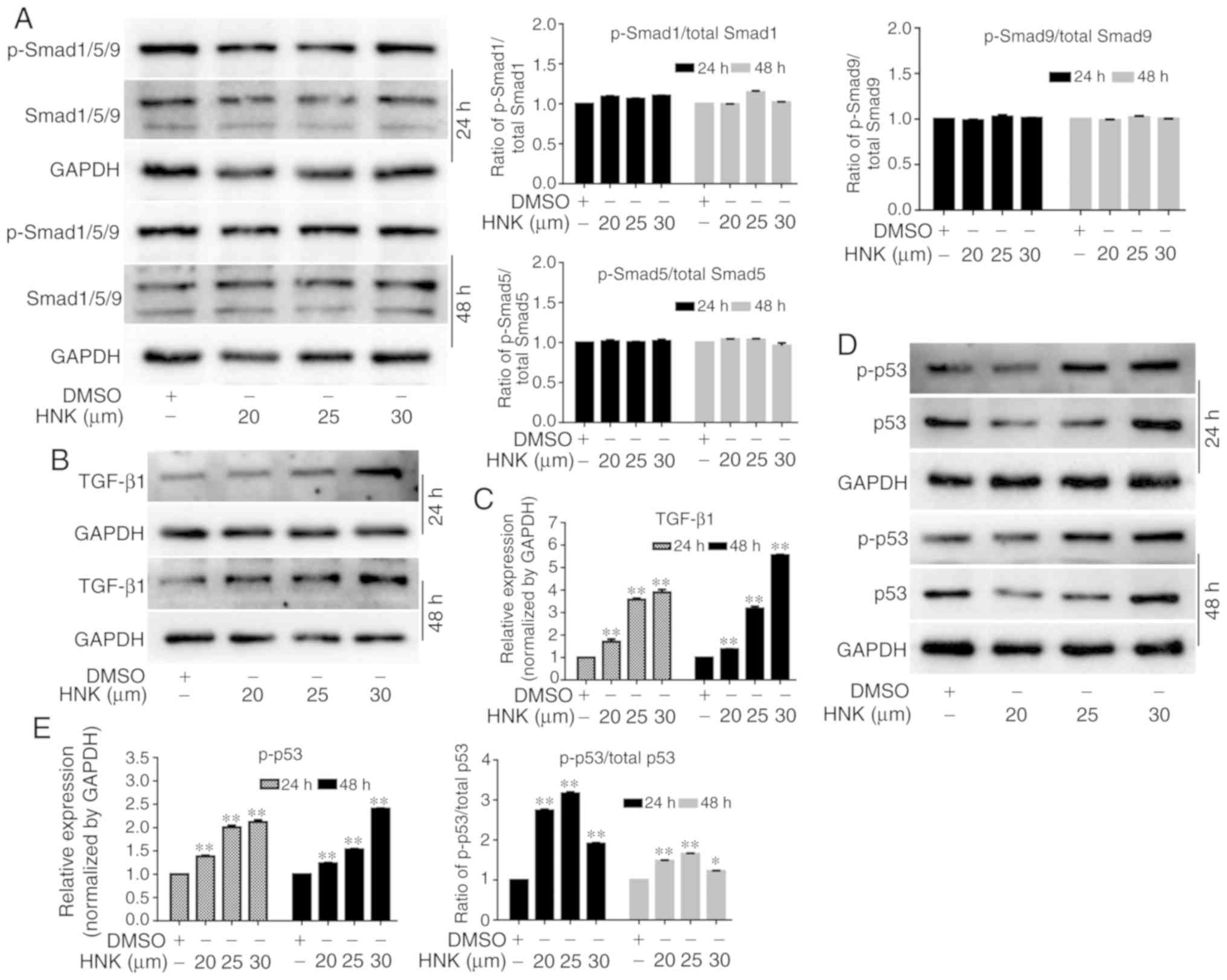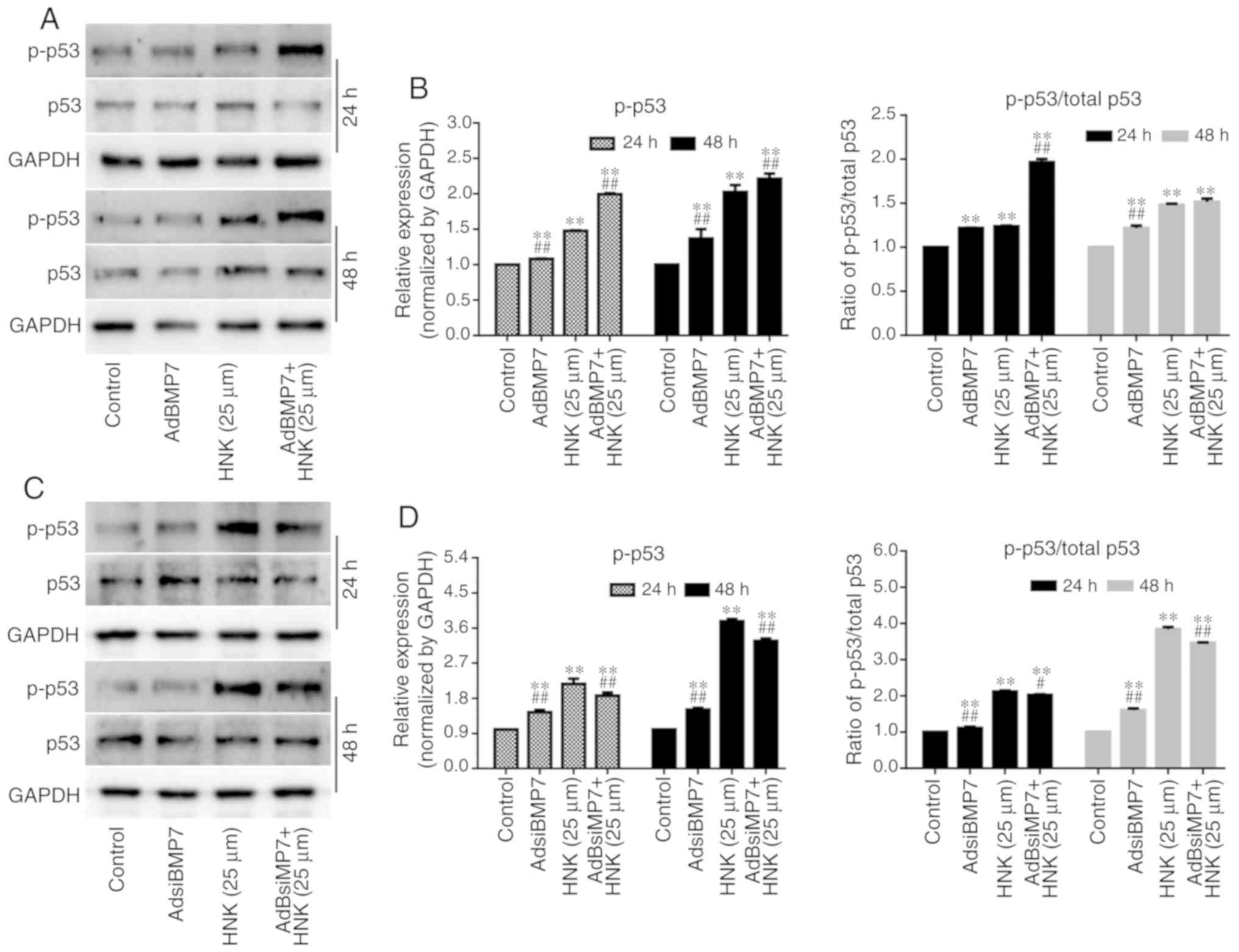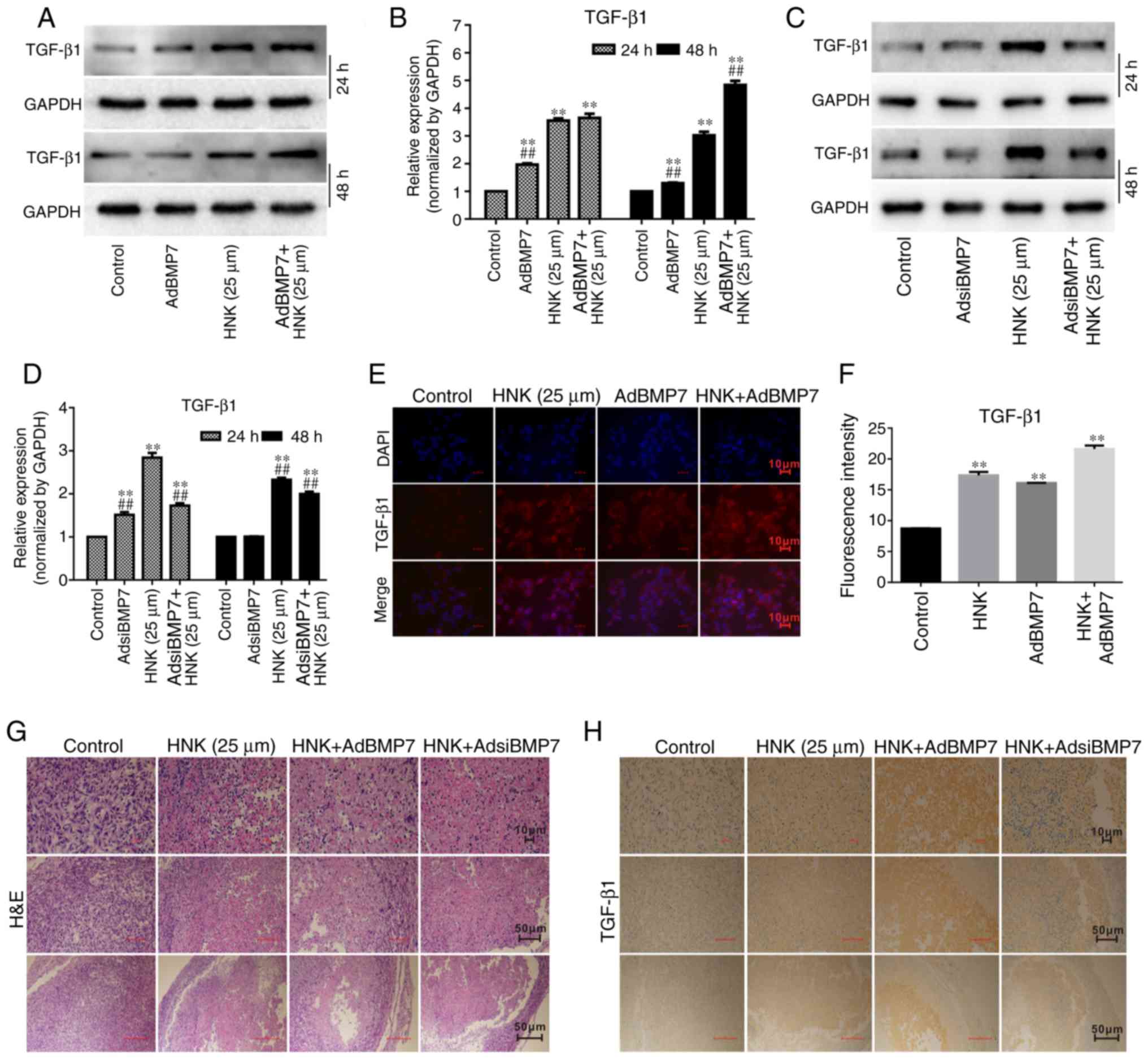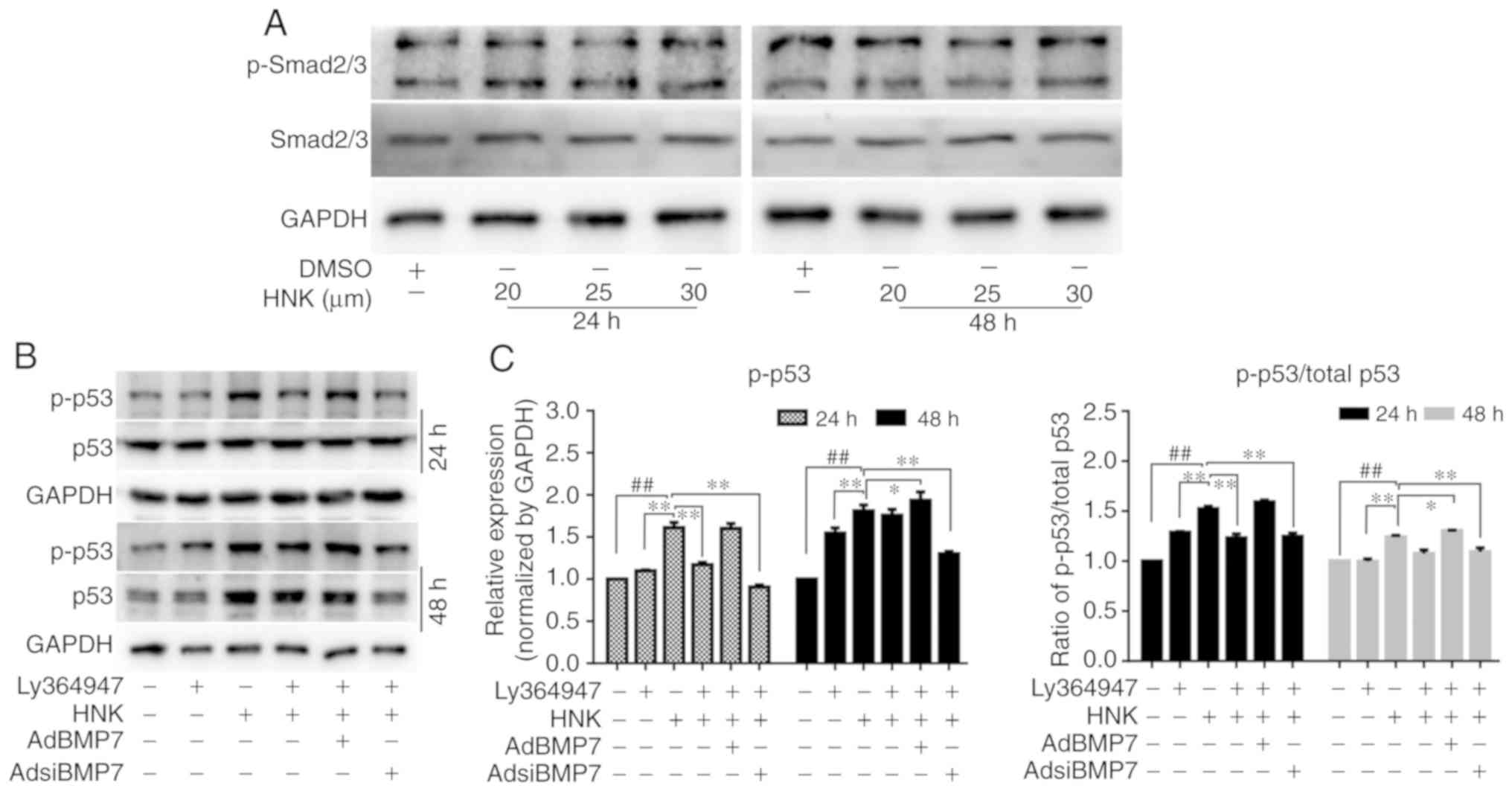|
1
|
Jemal A, Bray F, Center MM, Ferlay J, Ward
E and Forman D: Global cancer statistics. CA Cancer J Clin.
61:69–90. 2011. View Article : Google Scholar : PubMed/NCBI
|
|
2
|
Torre LA, Bray F, Siegel RL, Ferlay J,
Lortet-Tieulent J and Jemal A: Global cancer statistics, 2012. CA
Cancer J Clin. 65:87–108. 2015. View Article : Google Scholar : PubMed/NCBI
|
|
3
|
Meyers BM, Cosby R, Quereshy F and Jonker
D: Adjuvant chemotherapy for stage ii and iii colon cancer
following complete resection: A cancer care ontario systematic
review. Clin Oncol (R Coll Radiol). 29:459–465. 2017. View Article : Google Scholar : PubMed/NCBI
|
|
4
|
Dienstmann R, Salazar R and Tabernero J:
Personalizing colon cancer adjuvant therapy: Selecting optimal
treatments for individual patients. J Clin Oncol. 33:1787–1796.
2015. View Article : Google Scholar : PubMed/NCBI
|
|
5
|
Rosen AW, Degett TH and Gögenur I:
Individualized treatment of colon cancer. Ugeskr Laeger.
178:V111509162016.PubMed/NCBI
|
|
6
|
Wang W, Li Y, Chen Y, Chen H, Zhu P, Xu M,
Wang H, Wu M, Yang Z, Hoffman RM and Gu Y: Ethanolic extract of
traditional chinese medicine (TCM) gamboge inhibits colon cancer
via the Wnt/Beta-catenin signaling pathway in an orthotopic mouse
model. Anticancer Res. 38:1917–1925. 2018.PubMed/NCBI
|
|
7
|
Zhu L and Chen L: Progress in research on
paclitaxel and tumor immunotherapy. Cell Mol Biol Lett. 24:402019.
View Article : Google Scholar : PubMed/NCBI
|
|
8
|
Rauf A, Patel S, Imran M, Maalik A, Arshad
MU, Saeed F, Mabkhot YN, Al-Showiman SS, Ahmad N and Elsharkawy E:
Honokiol: An anticancer lignan. Biomed Pharmacother. 107:555–562.
2018. View Article : Google Scholar : PubMed/NCBI
|
|
9
|
Banik K, Ranaware AM, Deshpande V,
Nalawade SP, Padmavathi G, Bordoloi D, Sailo BL, Shanmugam MK, Fan
L, Arfuso F, et al: Honokiol for cancer therapeutics: A traditional
medicine that can modulate multiple oncogenic targets. Pharmacol
Res. 144:192–209. 2019. View Article : Google Scholar : PubMed/NCBI
|
|
10
|
Wang XD, Wang YL and Gao WF: Honokiol
possesses potential anti-inflammatory effects on rheumatoid
arthritis and GM-CSF can be a target for its treatment. Int J Clin
Exp Pathol. 8:7929–7936. 2015.PubMed/NCBI
|
|
11
|
Liu H, Zang C, Emde A, Planas-Silva MD,
Rosche M, Kühnl A, Schulz CO, Elstner E, Possinger K, Eucker J, et
al: Anti-tumor effect of honokiol alone and in combination with
other anti-cancer agents in breast cancer. Eur J Pharmacol.
591:43–51. 2008. View Article : Google Scholar : PubMed/NCBI
|
|
12
|
Wakefield LM and Hill CS: Beyond TGFβ:
Roles of other TGFβ superfamily members in cancer. Nat Rev Cancer.
13:328–341. 2013. View
Article : Google Scholar : PubMed/NCBI
|
|
13
|
Neuzillet C, Tijeras-Raballand A, Cohen R,
Cros J, Faivre S, Raymond E and de Gramont A: Targeting the TGFβ
pathway for cancer therapy. Pharmacol Ther. 147:22–31. 2015.
View Article : Google Scholar : PubMed/NCBI
|
|
14
|
Wrana JL, Attisano L, Wieser R, Ventura F
and Massagué J: Mechanism of activation of the TGF-beta receptor.
Nature. 370:341–347. 1994. View Article : Google Scholar : PubMed/NCBI
|
|
15
|
Katsuno Y, Lamouille S and Derynck R:
TGF-β signaling and epithelial-mesenchymal transition in cancer
progression. Curr Opin Oncol. 25:76–84. 2013. View Article : Google Scholar : PubMed/NCBI
|
|
16
|
Yeh HW, Lee SS, Chang CY, Lang YD and Jou
YS: A New Switch for TGFβ in Cancer. Cancer Res. 79:3797–3805.
2019. View Article : Google Scholar : PubMed/NCBI
|
|
17
|
Colak S and Ten Dijke P: Targeting TGF-β
Signaling in Cancer. Trends Cancer. 3:56–71. 2017. View Article : Google Scholar : PubMed/NCBI
|
|
18
|
Mitropoulos D, Kiroudi A, Christelli E,
Serafetinidis E, Zervas A, Anastasiou I and Dimopoulos C:
Expression of transforming growth factor beta in renal cell
carcinoma and matched non-involved renal tissue. Urol Res.
32:317–322. 2004. View Article : Google Scholar : PubMed/NCBI
|
|
19
|
Massague J: TGFbeta in Cancer. Cell.
134:215–230. 2008. View Article : Google Scholar : PubMed/NCBI
|
|
20
|
Bach DH, Park HJ and Lee SK: The dual role
of bone morphogenetic proteins in cancer. Mol Ther Oncolytics.
8:1–13. 2018. View Article : Google Scholar : PubMed/NCBI
|
|
21
|
Kim BR, Oh SC, Lee DH, Kim JL, Lee SY,
Kang MH, Lee SI, Kang S, Joung SY and Min BW: BMP-2 induces
motility and invasiveness by promoting colon cancer stemness
through STAT3 activation. Tumour Biol. 36:9475–9486. 2015.
View Article : Google Scholar : PubMed/NCBI
|
|
22
|
Wen J, Liu X, Qi Y, Niu F, Niu Z, Geng W,
Zou Z, Huang R, Wang J and Zou H: BMP3 suppresses colon
tumorigenesis via ActRIIB/SMAD2-dependent and TAK1/JNK signaling
pathways. J Exp Clin Cancer Res. 38:4282019. View Article : Google Scholar : PubMed/NCBI
|
|
23
|
Yuan SX, Wang DX, Wu QX, Ren CM, Li Y,
Chen QZ, Zeng YH, Shao Y, Yang JQ, Bai Y, et al: BMP9/p38 MAPK is
essential for the antiproliferative effect of resveratrol on human
colon cancer. Oncol Rep. 35:939–947. 2016. View Article : Google Scholar : PubMed/NCBI
|
|
24
|
Carreira AC, Zambuzzi WF, Rossi MC,
Astorino Filho R, Sogayar MC and Granjeiro JM: Bone morphogenetic
proteins: Promising molecules for bone healing, bioengineering, and
regenerative medicine. Vitam Horm. 99:293–322. 2015. View Article : Google Scholar : PubMed/NCBI
|
|
25
|
Alarmo EL, Pärssinen J, Ketolainen JM,
Savinainen K, Karhu R and Kallioniemi A: BMP7 influences
proliferation, migration, and invasion of breast cancer cells.
Cancer Lett. 275:35–43. 2009. View Article : Google Scholar : PubMed/NCBI
|
|
26
|
Hu M, Cui F, Liu F, Wang J, Wei X and Li
Y: BMP signaling pathways affect differently migration and invasion
of esophageal squamous cancer cells. Int J Oncol. 50:193–202. 2017.
View Article : Google Scholar : PubMed/NCBI
|
|
27
|
Liu RX, Ma Y, Hu XL, Ren WY, Liao YP, Wang
H, Zhu JH, Wu K, He BC and Sun WJ: Anticancer effects of oridonin
on colon cancer are mediated via BMP7/p38 MAPK/p53 signaling. Int J
Oncol. 53:2091–2101. 2018.PubMed/NCBI
|
|
28
|
Zeng YH, Zhou LY, Chen QZ, Li Y, Shao Y,
Ren WY, Liao YP, Wang H, Zhu JH, Huang M, et al: Resveratrol
inactivates PI3K/Akt signaling through upregulating BMP7 in human
colon cancer cells. Oncol Rep. 38:456–464. 2017. View Article : Google Scholar : PubMed/NCBI
|
|
29
|
Hayashi Y, Tsujii M, Kodama T, Akasaka T,
Kondo J, Hikita H, Inoue T, Tsujii Y, Maekawa A, Yoshii S, et al:
p53 functional deficiency in human colon cancer cells promotes
fibroblast-mediated angiogenesis and tumor growth. Carcinogenesis.
37:972–984. 2016. View Article : Google Scholar : PubMed/NCBI
|
|
30
|
Li Q, Hao Q, Cao W, Li J, Wu K, Elshimali
Y, Zhu D, Chen QH, Chen G, Pollack JR, et al: PP2Cδ inhibits
p300-mediated p53 acetylation via ATM/BRCA1 pathway to impede DNA
damage response in breast cancer. Sci Adv. 5:eaaw84172019.
View Article : Google Scholar : PubMed/NCBI
|
|
31
|
Nigro JM, Baker SJ, Preisinger AC, Jessup
JM, Hostetter R, Cleary K, Bigner SH, Davidson N, Baylin S, Devilee
P, et al: Mutations in the p53 gene occur in diverse human tumour
types. Nature. 342:705–708. 1989. View Article : Google Scholar : PubMed/NCBI
|
|
32
|
Jiang CP, Ding H, Shi DH, Wang YR, Li EG
and Wu JH: Pro-apoptotic effects of tectorigenin on human
hepatocellular carcinoma HepG2 cells. World J Gastroenterol.
18:1753–1764. 2012. View Article : Google Scholar : PubMed/NCBI
|
|
33
|
Luo J, Deng ZL, Luo X, Tang N, Song WX,
Chen J, Sharff KA, Luu HH, Haydon RC, Kinzler KW, et al: A protocol
for rapid generation of recombinant adenoviruses using the AdEasy
system. Nat Protoc. 2:1236–1247. 2007. View Article : Google Scholar : PubMed/NCBI
|
|
34
|
Livak KJ and Schmittgen TD: Analysis of
relative gene expression data using real-time quantitative PCR and
the 2(-Delta Delta C(T)) method. Methods. 25:402–408. 2001.
View Article : Google Scholar : PubMed/NCBI
|
|
35
|
Li HY, Ye HG, Chen CQ, Yin LH, Wu JB, He
LC and Gao SM: Honokiol induces cell cycle arrest and apoptosis via
inhibiting class I histone deacetylases in acute myeloid leukemia.
J Cell Biochem. 116:287–298. 2015. View Article : Google Scholar : PubMed/NCBI
|
|
36
|
Bumbat M, Wang M, Liang W, Ye P, Sun W and
Liu B: Effects of Me(2)SO and Trehalose on the cell viability,
proliferation, and bcl-2 family Gene (BCL-2, BAX, and
BAD) expression in cryopreserved human breast cancer cells.
Biopreserv Biobank. 18:33–40. 2020. View Article : Google Scholar : PubMed/NCBI
|
|
37
|
Yu B, Sun X, Shen HY, Gao F, Fan YM and
Sun ZJ: Expression of the apoptosis-related genes BCL-2 and BAD in
human breast carcinoma and their associated relationship with
chemosensitivity. J Exp Clin Cancer Res. 29:1072010. View Article : Google Scholar : PubMed/NCBI
|
|
38
|
Liu RX, Ren WY, Ma Y, Liao YP, Wang H, Zhu
JH, Jiang HT, Wu K, He BC and Sun WJ: BMP7 mediates the anticancer
effect of honokiol by upregulating p53 in HCT116 cells. Int J
Oncol. 51:907–917. 2017. View Article : Google Scholar : PubMed/NCBI
|
|
39
|
Ren CM, Li Y, Chen QZ, Zeng YH, Shao Y, Wu
QX, Yuan SX, Yang JQ, Yu Y, Wu K, et al: Oridonin inhibits the
proliferation of human colon cancer cells by upregulating BMP7 to
activate p38 MAPK. Oncol Rep. 35:2691–2698. 2016. View Article : Google Scholar : PubMed/NCBI
|
|
40
|
Paillas S, Boissière F, Bibeau F, Denouel
A, Mollevi C, Causse A, Denis V, Vezzio-Vié N, Marzi L, Cortijo C,
et al: Targeting the p38 MAPK pathway inhibits irinotecan
resistance in colon adenocarcinoma. Cancer Res. 71:1041–1049. 2011.
View Article : Google Scholar : PubMed/NCBI
|
|
41
|
Imperiale TF, Ransohoff DF, Itzkowitz SH,
Levin TR, Lavin P, Lidgard GP, Ahlquist DA and Berger BM:
Multitarget stool DNA testing for colorectal-cancer screening. N
Engl J Med. 370:1287–1297. 2014. View Article : Google Scholar : PubMed/NCBI
|
|
42
|
Zhao Y, Hu X, Zuo X and Wang M:
Chemopreventive effects of some popular phytochemicals on human
colon cancer: A review. Food Funct. 9:4548–4568. 2018. View Article : Google Scholar : PubMed/NCBI
|
|
43
|
Kundranda MN and Niu J: Albumin-bound
paclitaxel in solid tumors: clinical development and future
directions. Drug Des Devel Ther. 9:3767–3777. 2015. View Article : Google Scholar : PubMed/NCBI
|
|
44
|
Huang XM, Yang ZJ, Xie Q, Zhang ZK, Zhang
H and Ma JY: Natural products for treating colorectal cancer: A
mechanistic review. Biomed Pharmacother. 117:1091422019. View Article : Google Scholar : PubMed/NCBI
|
|
45
|
Wang X, Beitler JJ, Huang W, Chen G, Qian
G, Magliocca K, Patel MR, Chen AY, Zhang J, Nannapaneni S, et al:
Honokiol Radiosensitizes Squamous Cell Carcinoma of the Head and
Neck by Downregulation of Survivin. Clin Cancer Res. 24:858–869.
2018. View Article : Google Scholar : PubMed/NCBI
|
|
46
|
Tiwari S, Tirosh B and Rubinstein A:
Rubinstein, Increasing the affinity of cationized
polyacrylamide-paclitaxel nanoparticles towards colon cancer cells
by a surface recognition peptide. Int J Pharm. 531:281–291. 2017.
View Article : Google Scholar : PubMed/NCBI
|
|
47
|
Pan J, Lee Y, Wang Y and You M: Honokiol
targets mitochondria to halt cancer progression and metastasis. Mol
Nutr Food Res. 60:1383–1395. 2016. View Article : Google Scholar : PubMed/NCBI
|
|
48
|
Pan J, Lee Y, Zhang Q, Xiong D, Wan TC,
Wang Y and You M: Honokiol decreases lung cancer metastasis through
inhibition of the STAT3 signaling pathway. Cancer Prev Res (Phila).
10:133–141. 2017. View Article : Google Scholar : PubMed/NCBI
|
|
49
|
Jung B, Staudacher JJ and Beauchamp D:
Transforming growth factor β superfamily signaling in development
of colorectal cancer. Gastroenterology. 152:36–52. 2017. View Article : Google Scholar : PubMed/NCBI
|
|
50
|
Otegbeye F, Ojo E, Moreton S, Mackowski N,
Lee DA, de Lima M and Wald DN: Inhibiting TGF-beta signaling
preserves the function of highly activated, in vitro expanded
natural killer cells in AML and colon cancer models. PLoS One.
13:e01913582018. View Article : Google Scholar : PubMed/NCBI
|
|
51
|
Xie F, Ling L, van Dam H, Zhou F and Zhang
L: TGF-β signaling in cancer metastasis. Acta Biochim Biophys Sin
(Shanghai). 50:121–132. 2018. View Article : Google Scholar : PubMed/NCBI
|
|
52
|
Tauriello DVF, Palomo-Ponce S, Stork D,
Berenguer-Llergo A, Badia-Ramentol J, Iglesias M, Sevillano M,
Ibiza S, Cañellas A, Hernando-Momblona X, et al: TGFβ drives immune
evasion in genetically reconstituted colon cancer metastasis.
Nature. 554:538–543. 2018. View Article : Google Scholar : PubMed/NCBI
|
|
53
|
Saito A, Horie M, Micke P and Nagase T:
The role of TGF-β signaling in lung cancer associated with
idiopathic pulmonary fibrosis. Int J Mol Sci. 19:36112018.
View Article : Google Scholar
|
|
54
|
Urist MR: Bone: Formation by
autoinduction. Science. 150:893–899. 1965. View Article : Google Scholar : PubMed/NCBI
|
|
55
|
Chen D, Zhao M and Mundy GR: Bone
morphogenetic proteins. Growth Factors. 22:233–241. 2004.
View Article : Google Scholar : PubMed/NCBI
|
|
56
|
Tadokoro T, Gao X, Hong CC, Hotten D and
Hogan BL: BMP signaling and cellular dynamics during regeneration
of airway epithelium from basal progenitors. Development.
143:764–773. 2016. View Article : Google Scholar : PubMed/NCBI
|
|
57
|
Larsen Haidle J and Howe JR: Juvenile
Polyposis Syndrome. Adam MP: University of Washington; GeneReviews,
Seattle, WA: 1993, PubMed/NCBI
|
|
58
|
Vishnubalaji R, Yue S, Alfayez M, Kassem
M, Liu FF, Aldahmash A and Alajez NM: Bone morphogenetic protein 2
(BMP2) induces growth suppression and enhances chemosensitivity of
human colon cancer cells. Cancer Cell Int. 16:772016. View Article : Google Scholar : PubMed/NCBI
|
|
59
|
Shen W, Pang H, Xin B, Duan L, Liu L and
Zhang H: Biological effects of BMP7 on small-cell lung cancer cells
and its bone metastasis. Int J Oncol. 53:1354–1362. 2018.PubMed/NCBI
|
|
60
|
Carreira AC, Alves GG, Zambuzzi WF,
Sogayar MC and Granjeiro JM: Bone Morphogenetic Proteins:
Structure, biological function and therapeutic applications. Arch
Biochem Biophys. 561:64–73. 2014. View Article : Google Scholar : PubMed/NCBI
|
|
61
|
Ying X, Sun Y and He P: MicroRNA-137
inhibits BMP7 to enhance the epithelial-mesenchymal transition of
breast cancer cells. Oncotarget. 8:18348–18358. 2017. View Article : Google Scholar : PubMed/NCBI
|
|
62
|
Harris BRE, Wang D, Zhang Y, Ferrari M,
Okon A, Cleary MP, Wagner CR and Yang DQ: Induction of the p53
tumor suppressor in cancer cells through inhibition of
cap-dependent translation. Mol Cell Biol. 38:e00367–e00317. 2018.
View Article : Google Scholar : PubMed/NCBI
|
|
63
|
You D, Jung SP, Jeong Y, Bae SY and Kim S:
Wild-type p53 controls the level of fibronectin expression in
breast cancer cells. Oncol Rep. 38:2551–2557. 2017. View Article : Google Scholar : PubMed/NCBI
|
|
64
|
Dai L, Pan Q, Peng Y, Huang S, Liu J, Chen
T, Wang X, Chen D, Wang J, Zhu Y, et al: p53 plays a key role in
the apoptosis of human ovarian cancer cells induced by
adenovirus-mediated CRM197. Hum Gene Ther. 29:916–926. 2018.
View Article : Google Scholar : PubMed/NCBI
|
|
65
|
Li W, Lai B, Yang X, Zhang C and Wang H: A
truncated p53 in human lung cancer cells as a critical determinant
of proliferation and invasiveness. Tumour Biol.
39:10104283177038242017. View Article : Google Scholar : PubMed/NCBI
|
|
66
|
Yan W and Chen X: Targeted repression of
bone morphogenetic protein 7, a novel target of the p53 family,
triggers proliferative defect in p53-deficient breast cancer cells.
Cancer Res. 67:9117–9124. 2007. View Article : Google Scholar : PubMed/NCBI
|
|
67
|
Zerbini LF, Wang Y, Correa RG, Cho JY and
Libermann TA: Blockage of NF-kappaB induces serine 15
phosphorylation of mutant p53 by JNK kinase in prostate cancer
cells. Cell Cycle. 4:1247–1253. 2005. View Article : Google Scholar : PubMed/NCBI
|















